Parent page: Server Items
Altium Designer, in conjunction with your managed content server, caters for the ability to create and manage Draftsman Template Items - Draftsman Document Template and Draftsman Sheet Template - in that server. Such Items can be created:
- Through Direct Editing.
- By uploading the relevant Draftsman Document/Sheet Template file (*.DwfDot/*.DwsDot) to a revision of a target Item.
Once a Draftsman Template Item has been created (and data released into a revision of it), and its lifecycle state set to a level that the organization views as ready for use at the design level, it can be reused in future board-level design projects, when creating Draftsman documents (*.PCBDwf).
In addition, a managed Draftsman Document/Sheet Template Item can be used as a configuration data item in one or more defined Environment Configurations. An environment configuration is used to constrain a designer's Altium NEXUS working environment to only use company-ratified design elements. Environment configurations are defined and stored within the Team Configuration Center - a service provided through the NEXUS Server installation, and the facilitator of this concept of Environment Configuration Management.
Draftsman is an alternate way to create the graphical documents for board design production. Based on a dedicated file format and set of drawing tools, the Draftsman drawing system provides an interactive approach to bringing together fabrication and assembly drawings with custom templates, annotations, dimensions, callouts, and notes. For more information see
Draftsman.
Folder Type
When creating the folder in which to store Draftsman Template Items, you can specify the folder's type. This has no bearing on the content of the folder - releasing a Draftsman Document Template or Draftsman Sheet Template will always result in a corresponding Draftsman Template Item. It simply provides a visual 'clue' as to what is stored in a folder and can be beneficial when browsing a server for particular content. To nominate a folder's use as a container for Draftsman Template Items, set its Folder Type as Draftsman Templates, when defining the folder properties in the Edit Folder dialog.
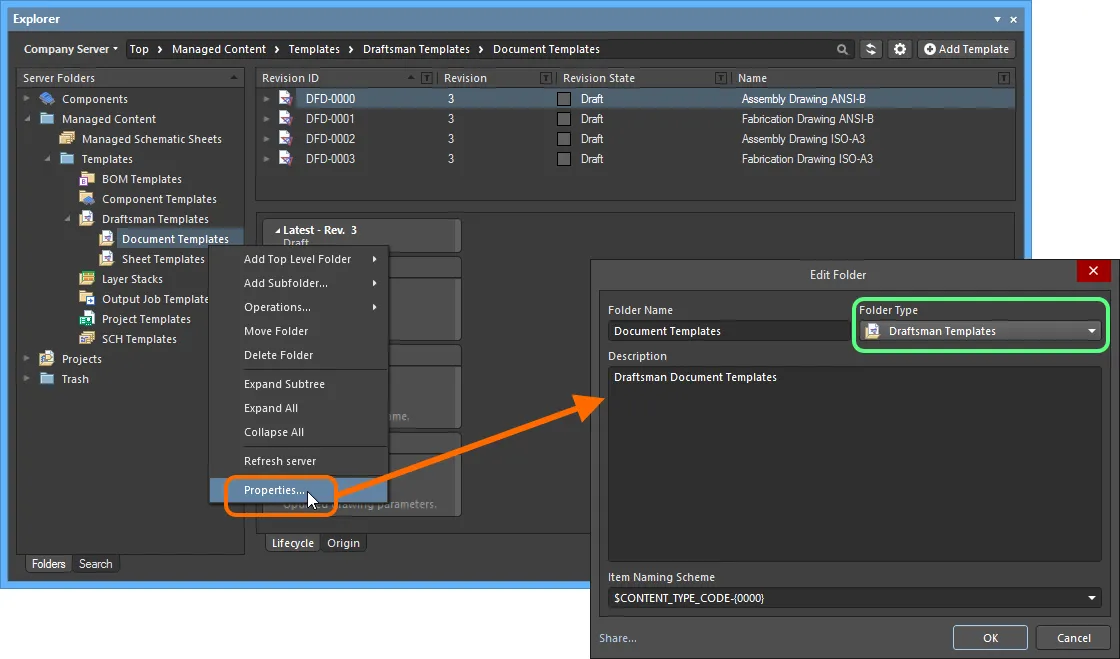
Specifying the folder type - its intended use - gives a visual indication of the content of that folder when browsing the server.
Item Naming Scheme
Another important aspect of the parent folder is the Item Naming Scheme employed for it. This defines the format of the unique ID for each Item created in that particular folder. Several default example schemes are available, utilizing the short-form code for either the folder type (DRT - Draftsman Templates) or the content type (DFD - Draftsman Document, DFS - Draftsman Sheet):
- $CONTENT_TYPE_CODE-001-{0000} - for example, DFD-001-0001, DFS-001-0001.
- $CONTENT_TYPE_CODE-001-{A00} - for example, DFD-001-A01, DFS-001-A01.
- $FOLDER_TYPE_CODE-001-{0000} - for example, DRT-001-0001.
- $FOLDER_TYPE_CODE-001-{A000} - for example, DRT-001-A001.
Using a default naming scheme, the software will automatically assign the next available unique ID, based on that scheme, having scanned the entire server and identifiers of existing Items. This can be a great time-saver when manually creating Draftsman Template Items.
A custom scheme can also be defined for a folder, simply by typing it within the field, ensuring that the variable portion is enclosed in curly braces (e.g. DraftsmanDOC-TMP-{0000}, or DraftsmanSHEET-TMP-{0000}).
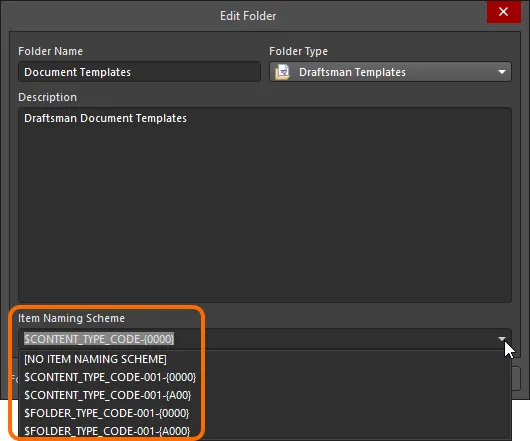
The Item Naming Scheme of the parent folder is applied to the Unique ID for each Item
created within that folder.
The Item Naming Scheme employed for the parent folder can be changed at any time. The modified scheme will then be applied to any subsequent newly-created Items within that folder.
Item Types
When creating a target Draftsman Template Item in which to store your document/sheet template, ensure that its Content Type is set accordingly (in the Create New Item dialog):
- For a Draftsman Document Template Item, set its Content Type to
Draftsman Document Template.
- For a Draftsman Sheet Template Item, set its Content Type to
Draftsman Sheet Template.
If you are creating these Items in a Draftsman Templates type folder, these Item types will be available from the right-click context menu when creating the Items.
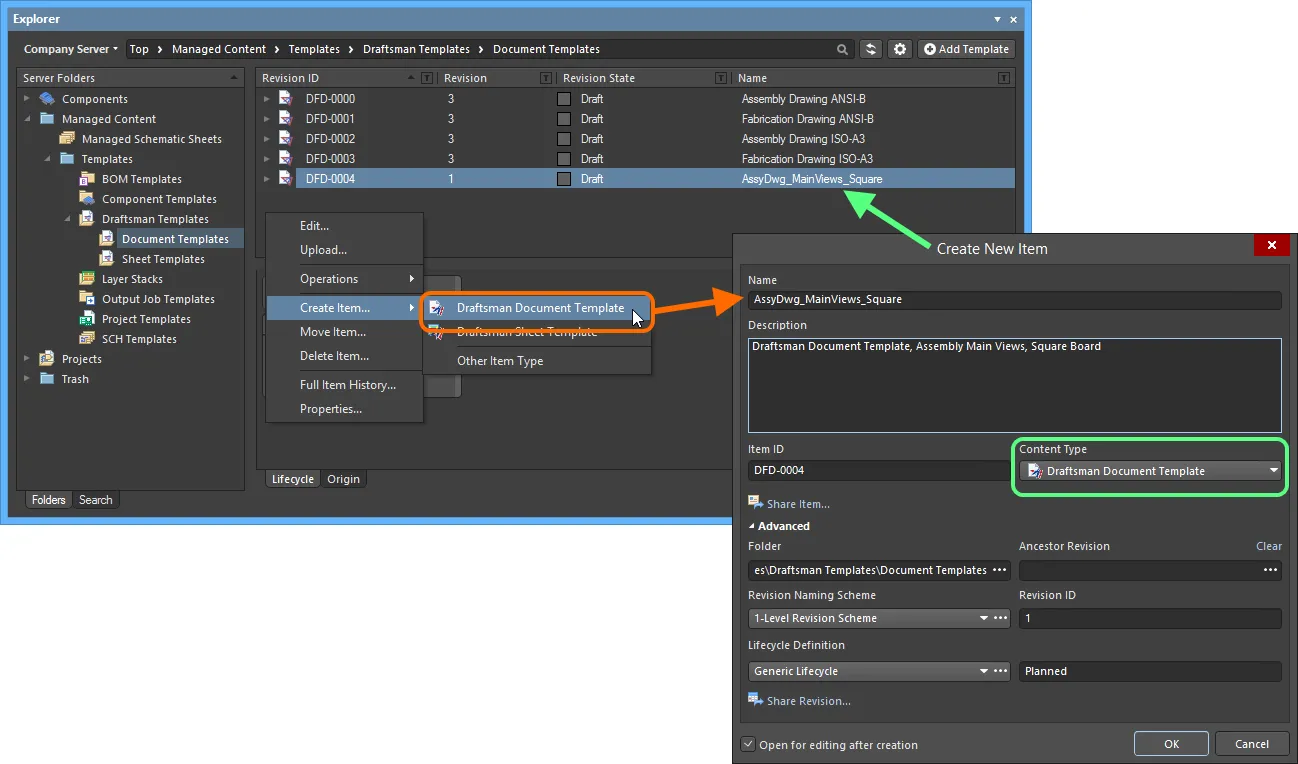
Creating a Draftsman Document Template Item within a Draftsman Templates folder - the correct Content Type is available on the context menu.
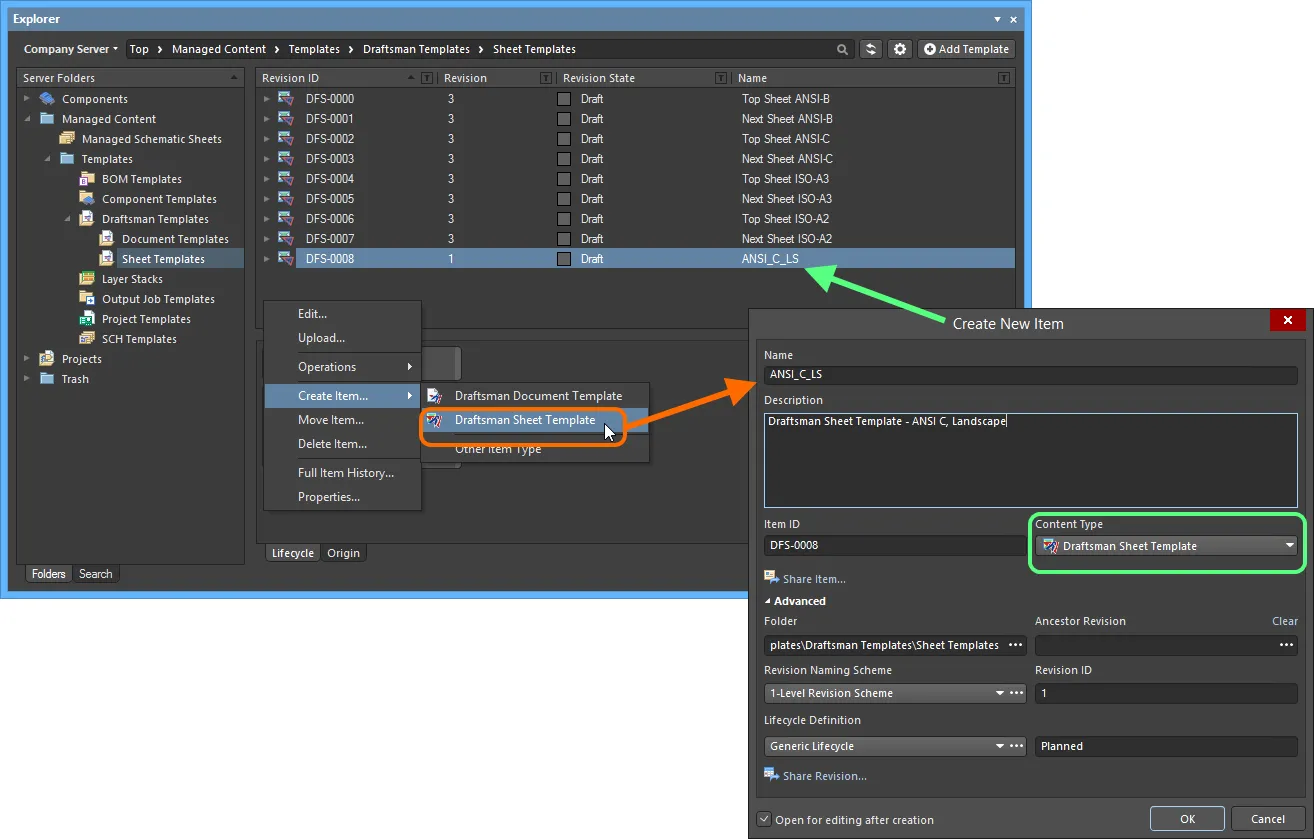 Creating a Draftsman Sheet Template Item within a Draftsman Templates folder - the correct Content Type is available on the context menu.
Creating a Draftsman Sheet Template Item within a Draftsman Templates folder - the correct Content Type is available on the context menu.
Item Lifecycle Definition and Revision Naming
When defining a Draftsman Template Item, be sure to specify the type of lifecycle management to be used for the Item, and the naming scheme employed for its revisions, respectively.
Control over which Item types can use a particular lifecycle definition or revision naming scheme, can be defined and enabled at a global level from within the Content Types dialog, when defining each schema. The default schemes assigned for use by a Draftsman Document/Sheet Template Item are: Generic Lifecycle and 1-Level Revision Scheme, respectively.
Once a template definition has been released into the initial revision of a Draftsman Template Item, these schemes cannot be changed for that particular Item.
Specify the required schemes in the Create New Item dialog, using the Lifecycle Definition and Revision Naming Scheme fields respectively.
If the option to control use of lifecycle definitions and revision naming schemes per content type is enabled for any definitions/schemes, and the Draftsman Document/Sheet Template Item type is not set to use a particular definition/scheme, then that definition/scheme will not be available in the applicable drop-down list.
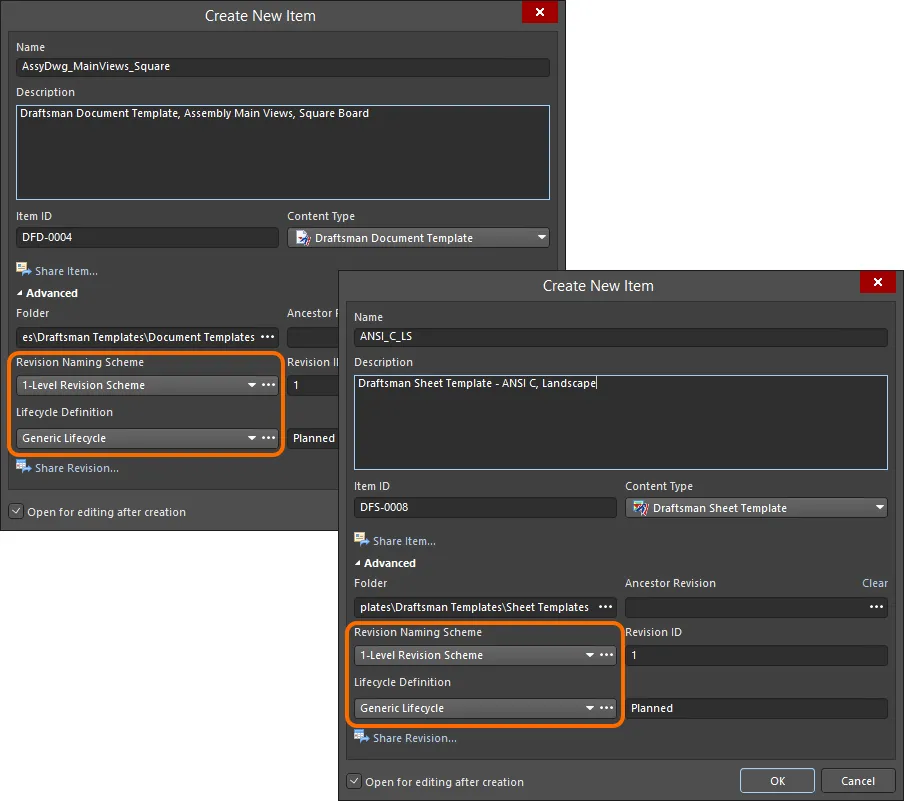
Selecting the Lifecycle Definition and Revision Naming schemes for a manually created Item.
Observing standard revision naming schemes and lifecycle definitions, across the various types of design item in a managed content server ensures smooth, consistent management of those items.
It is a good idea to add a Name and Description as part of the Item's definition. This information is used when searching the server and enables quick identification of what a Draftsman Document/Sheet Template Item offers.
Releasing a Draftsman Template
So far, we've discussed the support for a Draftsman Document/Sheet Template Item in the server, in terms of related folder and item types. Releasing an actual defined template into a revision of such an item can be performed in a single streamlined way.
A draftsman document/sheet template can be edited and released into the initial revision of a newly-created Draftsman Document/Sheet Template Item, courtesy of the server's support for direct editing. Direct editing frees you from the shackles of separate version-controlled source data. You can simply edit a supported Item type using a temporary editor loaded with the latest source direct from the server itself. And once editing is complete, the entity is released (or re-released) into a subsequent planned revision of its parent Item, and the temporary editor closed. There are no files on your hard drive, no questioning whether you are working with the correct or latest source, and no having to maintain separate version control software. The managed content server handles it all, with great integrity, and in a manner that greatly expedites changes to your data.
When you create a Draftsman Document/Sheet Template Item, you have the option to edit and release a document/sheet template into the initial revision of that item, after creation. To do so, enable the option Open for editing after creation, at the bottom of the Create New Item dialog (which is enabled by default). The Item will be created and the temporary PcbDrawing Editor will open, presenting a .DwfDot or .DwsDot document (as applicable) as the active document in the main design window. This document will be named according to the Item-Revision, in the format:
- <Item><Revision>.DwfDot (e.g. DFD-0004-1.DwfDot) - for a Draftsman Document Template.
- <Item><Revision>.DwsDot (e.g. DFS-0008-1.DwsDot) - for a Draftsman Sheet Template.
A Draftsman document relies on a PCB document for context. To be able to define document options for a Draftsman Document Template while direct editing, a temporary PCB document is created (with the same name as the template), to provide this context.

Example of editing the initial revision of a Draftsman Document Template Item, directly from the server - the temporary PcbDrawing Editor provides the document with which to define your document template.

Example of editing the initial revision of a Draftsman Sheet Template Item, directly from the server - the temporary PcbDrawing Editor provides the document with which to define your sheet template.
Use the document to define the template as required. For more information, see Draftsman.
There are three relevant controls when direct editing, readily available from the Quick Access Bar (at the top-left of the main application window), or from the Drawing Document Standard toolbar:
-
 - Save Active Document. Use this button to save any changes made to the document. This allows you to save current changes, should you wish to come back at a later stage to make further changes before ultimately releasing to the managed content server.
- Save Active Document. Use this button to save any changes made to the document. This allows you to save current changes, should you wish to come back at a later stage to make further changes before ultimately releasing to the managed content server.
-
 - Release Document. Use this button to release (effectively save and release) the defined template document to the managed content server, storing it within the initial (planned) revision of the target Draftsman Document/Sheet Template Item. The Create Revision dialog will appear, in which you can change Name, Description, and add release notes as required. The document and editor will close after the release. The template document, *.DwfDot/*.DwsDot, will be stored in the revision of the Item.
- Release Document. Use this button to release (effectively save and release) the defined template document to the managed content server, storing it within the initial (planned) revision of the target Draftsman Document/Sheet Template Item. The Create Revision dialog will appear, in which you can change Name, Description, and add release notes as required. The document and editor will close after the release. The template document, *.DwfDot/*.DwsDot, will be stored in the revision of the Item.
-
 - Cancel Editing. Use this button if you wish to cancel editing. The document and editor will close, and nothing will be released to the target Draftsman Document/Sheet Template Item.
- Cancel Editing. Use this button if you wish to cancel editing. The document and editor will close, and nothing will be released to the target Draftsman Document/Sheet Template Item.
These controls are also available as commands - Save (Shortcut: Ctrl+S), Release to Server (Shortcut: Alt+Ctrl+S), and Cancel Edit - from the main File menu.
The released data stored in the server consists of the source template, defined in the Draftsman Document/Sheet Template file (<Item><Revision>.DwfDot/<Item><Revision>.DwsDot).
Uploading a Draftsman-related File
You can also upload a Draftsman Document/Sheet Template file into the revision of a Draftsman Document/Sheet Template Item. This can be performed in a couple of ways.
Upload Menu
A Draftsman Document/Sheet Template file can be uploaded by right-clicking on the required Draftsman Document/Sheet Template Item in the Explorer panel, and choosing the Upload command from the context menu. The Create New Revision dialog will appear, in which you can change Name, Description, and add release notes as required. Use the Sources region of the dialog to load the required Draftsman Document/Sheet Template file. This can be performed by dragging and dropping the file from Windows Explorer, onto the region. Alternatively, click the  button - the Add Files dialog (a standard Windows open-type dialog) will appear. Use this to browse to, and open, the required file (*.DwfDot/*.DwsDot).
button - the Add Files dialog (a standard Windows open-type dialog) will appear. Use this to browse to, and open, the required file (*.DwfDot/*.DwsDot).
If the Item has no planned revision, upload will be to the next planned revision, created on-the-fly as part of the upload process.
 Manually specifying the Draftsman Document Template file to be uploaded to the target Draftsman Document Template Item. The process is identical for uploading a Draftsman Sheet Template file to a target Draftsman Sheet Template Item.
Manually specifying the Draftsman Document Template file to be uploaded to the target Draftsman Document Template Item. The process is identical for uploading a Draftsman Sheet Template file to a target Draftsman Sheet Template Item.
Once the desired file is dropped in, or selected and the Open button clicked, an entry for it will appear back in the Sources region. Proceed with the upload by clicking the OK button.
 An entry for the chosen file appears in the Sources region - clicking OK will proceed to upload the file to the revision of the target Item.
An entry for the chosen file appears in the Sources region - clicking OK will proceed to upload the file to the revision of the target Item.
Drag and Drop from Windows Explorer
A Draftsman Document/Sheet Template file can also be uploaded by dragging the selected file from a source folder in your Windows Explorer, and dropping onto the required target Draftsman Document/Sheet Template Item in the Explorer panel. The Create New Revision dialog will appear, with the dragged file listed in the Sources region. Modify Name (which will be the file name, including extension) and Description (which will be in the format Uploaded from <FileNameandPath>, Size <FileSize>, Created on <FileCreationDate>), and add any Release Notes as required, and then click the OK button.
If the existing Draftsman Document/Sheet Template Item has no planned revision, upload will be to the next planned revision, created on-the-fly as part of the upload process. If you drop the dragged file away from an existing Item, a new Draftsman Document/Sheet Template Item will be created. The
Create New Item dialog will appear. The
Name of the item will be the file name, including extension. The
Description will be in the format
Uploaded from <FileNameandPath>, Size <FileSize>, Created on <FileCreationDate>. Change these as required. The
Item ID will be in accordance with the Item Naming scheme defined at the folder level. If the folder has no naming scheme defined, naming will follow the
$CONTENT_TYPE_CODE-001-{0000} scheme.
 Uploading a Draftsman Sheet Template file using the drag and drop method. The process is identical for uploading a Draftsman Document Template file to a target Draftsman Document Template Item.
Uploading a Draftsman Sheet Template file using the drag and drop method. The process is identical for uploading a Draftsman Document Template file to a target Draftsman Document Template Item.
Reusing a Managed Draftsman Template Item
Related page: Controlling Access to Server Content
Once a Draftsman document/sheet template has been released to a managed content server, and its lifecycle state set to a level that the organization views as ready for use at the design level, that template can be reused in future board-level design projects.
When you are signed in to your managed content server, use of available Draftsman Document/Sheet Template Items is automatic. If there are released revisions of Draftsman Document/Sheet Template Items, then only those available templates - shared with you - will be presented in the following areas where a document template, or sheet template, can be chosen, when working with a Draftsman Document (*.PCBDwf):
New Document Dialog
In the New Document dialog, accessed when adding a new Draftsman document to your design project, only those Draftsman Document Template Items available to you through your server login, will be available to use through the dialog's Templates listing.
The latest revision of each available item will be used. In addition the templates are listed in the format <ItemName> (v.<Revision>).
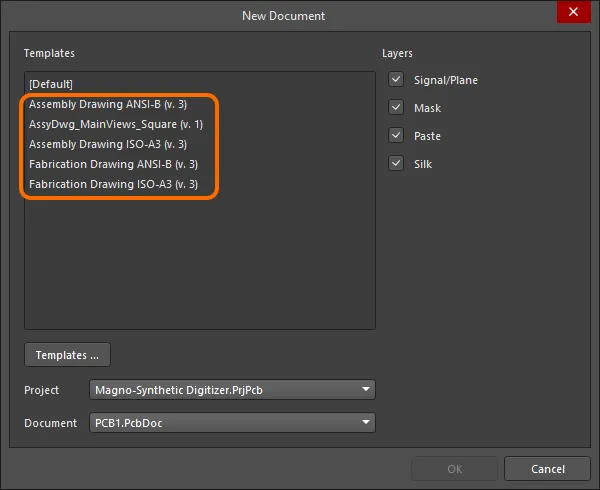
If Draftsman Document Template Items exist, then when signed into the server they will be presented,
instead of the local (file-based) templates.
Properties Panel
When setting up page-related options for the active Draftsman document - on the Page Options tab of the Properties panel - only those Draftsman Sheet Template Items available to you through your server login, will be available to use from the Template drop-down field, in the Formatting and Size region of the tab (when the Template mode is active).
The latest revision of each available item will be used. In addition the templates are listed in the format <ItemName> (v.<Revision>).
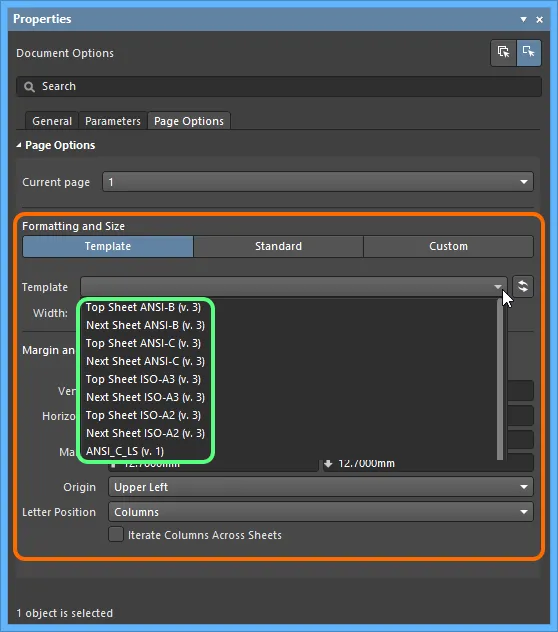
If Draftsman Sheet Template Items exist, then when signed into the server they will be
presented, instead of the local templates.
If there are no released revisions of Draftsman Document/Sheet Template Items in the server, or if you sign out of your server, then you will be able to use local, file-based templates.
If you do not sign in to your managed content server you can still work with Altium Designer (under your valid Altium Designer License), but you will not be able to access your organization's managed content server, or any other services it provides. You will therefore not be able to reuse any managed Draftsman Document/Sheet Template Items. You will only be able to use file-based templates defined locally, and available from the templates folder specified on the
Draftsman - Templates page of the
Preferences dialog.
A released Draftsman Document/Sheet Template can also be used as a configuration data item in one or more defined
Environment Configurations. An environment configuration is used to constrain a designer's Altium NEXUS working environment to only use company-ratified design elements. Environment configurations are defined and stored within the Team Configuration Center - a service provided through the NEXUS Server installation. Once you have signed in to the server, and chosen (if applicable) from the selection of environment configurations available to you, Altium NEXUS will be configured, with respect to use of Draftsman Document/Sheet Templates. If the chosen environment configuration has one or more defined Draftsman Document/Sheet Template Items, then
only those defined definitions can be used. If the chosen environment configuration applicable to you does not have any Draftsman Document/Sheet Template Items specified/added, or is set to
Do Not Control, then all available released item revisions (shared with you) will be available (automatic reuse). If there are no released revisions of Draftsman Document/Sheet Template Items in the server, then you will be able to use local, file-based templates. For more information, see
Environment Configuration Management.
Re-Releasing a Draftsman Template Item
At any stage, you can come back to any revision of a Draftsman Document/Sheet Template Item in the server, and edit it directly. Right-click on the revision and choose the Edit command from the context menu. Once again, the temporary editor will open, with the template contained in the revision, opened for editing. Make changes as required, then commit the release of the document into the next revision of the item.
Right-clicking on the top-level entry for an Item itself, will edit the latest revision of that Item.
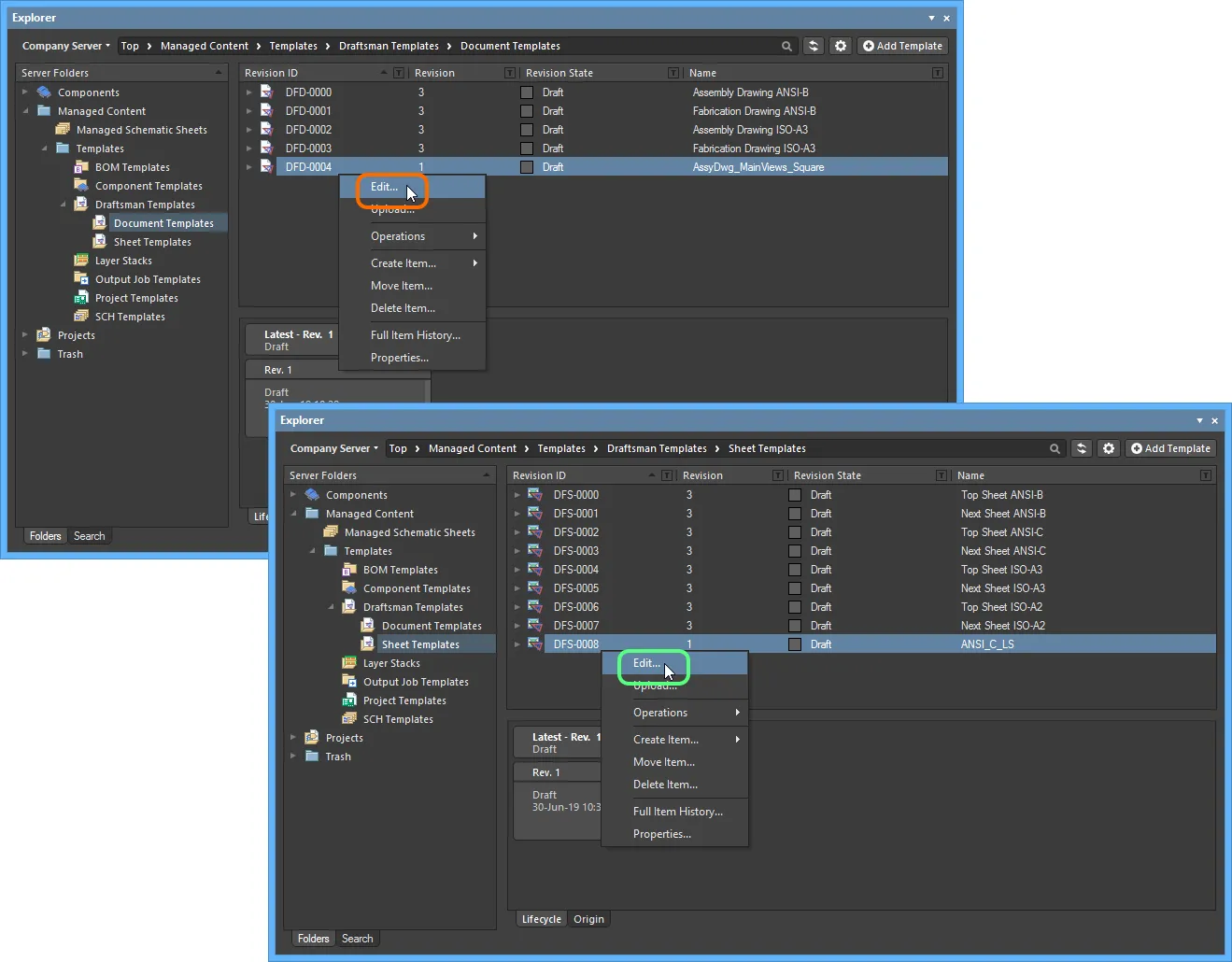
Accessing the command to launch direct editing of an existing revision of a Draftsman Document/Sheet Template Item.
Updating a Draftsman Template Item
If you need to change the Draftsman Document/Sheet Template stored in a Draftsman Document/Sheet Template Item, and you have the updated Draftsman Document/Sheet Template file, you can upload that file to that Item - the new file will be stored in the next revision of that Item.
Downloading Released Data
Download the data stored in a revision of a Draftsman Document/Sheet Template Item by right-clicking on that revision and choosing the Operations » Download command from the context menu. The Draftsman Document/Sheet Template file will be downloaded into a sub-folder under the chosen directory, named using the Item Revision ID. The file can be found in the Released folder therein.
Access the Download command from the top-level entry for a Draftsman Document/Sheet Template Item itself, to download the template file stored in the latest revision of that Item.
Click the Explore button in the Download from Server dialog, to quickly explore to the download folder.